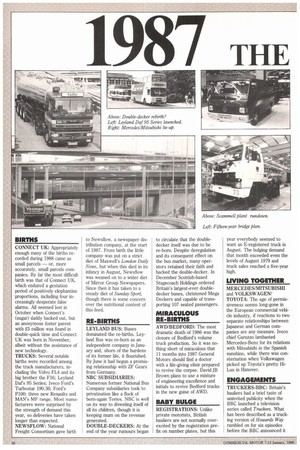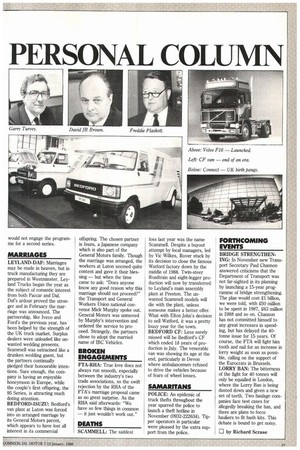1987 THE
Page 28

Page 29

If you've noticed an error in this article please click here to report it so we can fix it.
PERSONAL COLUMN
BIRTHS
CONNECT UK: Appropriately enough many of the births recorded during 1988 came as small parcels — or, more accurately, small parcels companies. By far the most difficult birth was that of Connect UK, which endured a gestation period of positively elephantine proportions, including four increasingly desperate false alarms. All seemed lost in October when Connect's (sugar) daddy backed out, but an anonymous foster parent with £5 million was found in double-quick time and Connect UK was born in November, albeit without the assistance of new technology.
TRUCKS: Several notable births were recorded among the truck manufacturers, including the Volvo FM and its big brother the F16; Leyland Daf's 95 Series; Iveco Ford's Turbostar 190.36; Ford's P100; three new Renaults and MAN's MF range. Most manufacturers were surprised by the strength of demand this year, so deliveries have taken longer than expected. NEWSFLOW: National Freight Consortium gave birth
to Newsilow, a newspaper distribution company, at the start of 1987. From birth the little company was put on a strict diet of Maxwell's London Daily News, but when this died in its infancy in August, Newsflow was weaned on to a wider diet of Mirror Group Newspapers. Since then it has taken to a steady diet of Sunday sport, though there is some concern over the nutritional content of this feed.
RE-BIRTHS
LEYLAND BUS: Buses dominated the re-births. Leyland Bus was re-born as an independent company in January and, shorn of the burdens of its former life, it flourished. By June it had begun a promising relationship with ZF Gears from Germany.
NBC SUBSIDIARIES: Numerous former National Bus Company subsidiaries took to privatisation like a flock of born-again Tories. NBC is well on its way to divesting itself of all its children, though it is keeping mum on the revenue generated. DOUBLE-DECKERS: At the end of the year rumours began to circulate that the doubledecker itself was due to be re-born. Despite deregulation and its consequent effect on the bus market, many operators retained their faith and backed the double-decker. In December Scottish-based Stagecoach Holdings ordered Britain's largest-ever doubledecker buses, christened Mega Deckers and capable of transporting 107 seated passengers.
MIRACULOUS RE-BIRTHS
AWD/BEDFORD: The most dramatic death of 1986 was the closure of Bedford's volume truck production. So it was nothing short of miraculous that 11 months into 1987 General Motors should find a doctor with a life-giving elixir prepared to revive the corpse. David JB Brown plans to use a mixture of engineering excellence and initials to revive Bedford trucks in the new guise of AWD.
BABY BULGE
REGISTRATIONS: Unlike private motorists, British hauliers are not normally overexcited by the registration prefix on number plates, but this year everybody seemed to want an E-registered truck in August. The bulging demand that month exceeded even the levels of August 1979 and truck sales reached a five-year high.
LIVING TOGETHER
MERCEDES/MITSUBISHI and VOLKSWAGEN/ TOYOTA: The age of permissiveness seems long-gone in the European commercial vehicle industry, if reactions to two separate relationships between Japanese and German companies are any measure. Iveco chief Garuzzo lambasted Mercedes-Benz for its relations with Mitsubishi in the Spanish sunshine, while there was consternation when Volkswagen picked up Toyota's pretty HiLux in Hanover.
ENGAGEMENTS
TRUCKERS-BBC: Britain's hauliers had a brief taste of uninvited publicity when the BBC launched a television series called Truckers. What has been described as a trucking version of Howards Way rambled on for six episodes before the BBC announced it would not engage the programme for a second series.
MARRIAGES
LE YLAND-DAF: Marriages may be made in heaven, but in truck manufacturing they are prepared in Westminster. Leyland Trucks began the year as the subject of romantic interest from both Paccar and Daf. Dafs ardour proved the stronger and in February the marriage was announced. The partnership, like Iveco and Ford's the previous year, has been helped by the strength of the UK truck market. Surplus dealers were unloaded like unwanted wedding presents. Scammell was ostracised like a drunken wedding guest, but the partners continually pledged their honourable intentions. Sure enough, the company is having an enjoyable honeymoon in Europe, while the couple's first offspring, the 95 Series, is attracting much doting attention. BEDFORD-ISUZU: Bedford's van plant at Luton was forced into an arranged marriage by its General Motors parent, which appears to have lost all interest in its commercial offspring. The chosen partner is Isuzu, a Japanese company which is also part of the General Motors family. Though the marriage was arranged, the workers at Luton seemed quite content and gave it their blessing — but when the time came to ask: "Does anyone know any good reason why this marriage should not proceed?" the Transport and General Workers Union national convenor Mick Murphy spoke out. General Motors was unmoved by Murphy's intervention and ordered the service to proceed. Strangely, the partners chose to adopt the married name of IBC Vehicles.
BROKEN ENGAGEMENTS
FTA-RHA: True love does not always run smooth, especially between the industry's two trade associations, so the swift rejection by the RHA of the FTA's marriage proposal came as no great surprise. As the RI-IA said afterwards: "We have so few things in common — it just wouldn't work out."
DEATHS
SCAMMELL: The saddest loss last year was the name Scammell. Despite a buyout attempt by local managers, led by Vic Wilkes, Rover stuck by its decision to close the famous Watford factory down by the middle of 1988. Twin-steer Roadtrain and eight-le,gger production will now by transferred to Leyland's main assembly plant at Preston. The unwanted Scammell models will die with the plant, unless someone makes a better offer. What with Elton John's decision to sell Watford, it was a pretty lousy year for the town. BEDFORD CF: Less sorely missed will be Bedford's CF which ended 18 years of production in July. The venerable van was showing its age at the end, particularly in Devon where arnbulancemen refused to drive the vehicles because of fears of wheel losses.
SAMARITANS
POLICE: An epidemic of truck thefts throughout the year spurred the police to launch a theft hotline in November (0932-222634). Tipper operators in particular were pleased by the extra support from the police.
FORTHCOMING EVENTS
BRIDGE STRENGTHENING: In November new Transport Secretary Paul Channon answered criticisms that the Department of Transport was not far-sighted in its planning by launching a 15-year programme of bridge strengthening. The plan would cost £1 billion, we were told, with 250 million to be spent in 1987, 263 million in 1988 and so on. Channon has not committed himself to any great increases in spending, but has delayed the 40tonne issue for 15 years. Of course, the FTA will fight him tooth and nail for an increase in lorry weight as soon as possible, calling on the support of the Eurocrats in Brussels. LORRY BAN: The bitterness of the fight for 40 tonnes will only be equalled in London, where the Lorry Ban is being dusted down and given a new set of teeth. Two haulage companies face test cases for allegedly breaking the ban, and there are plans to force hauliers to fit hush kits. This debate is bound to get noisy.
by Richard Scrase
































































